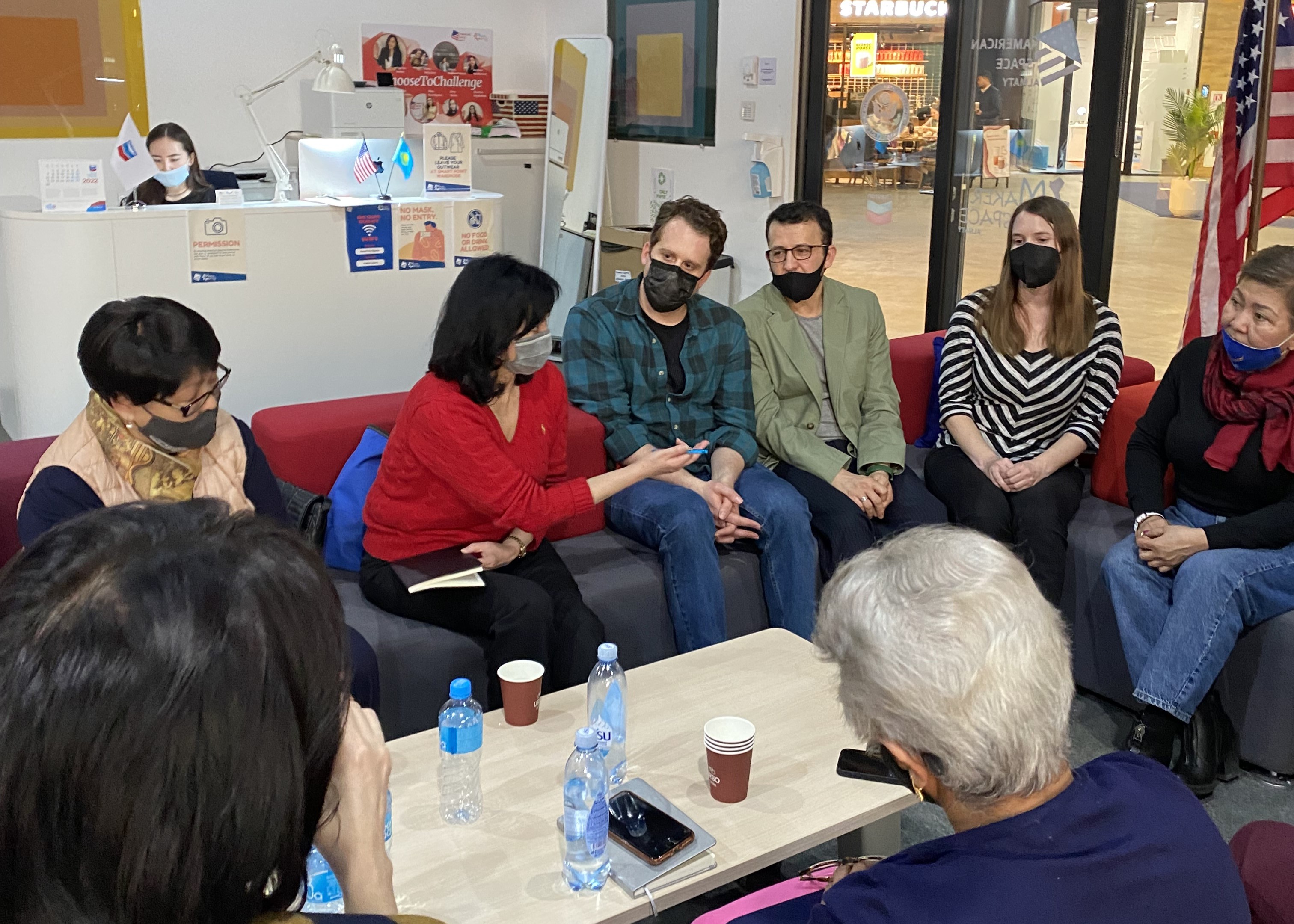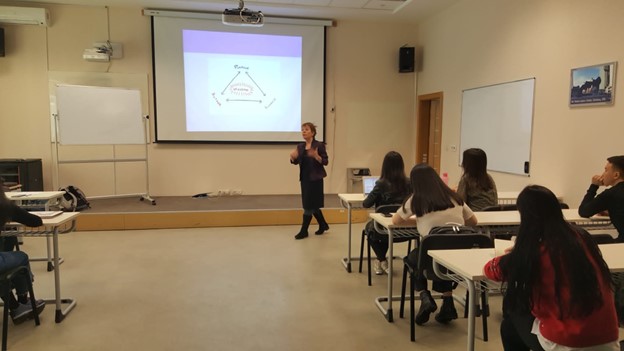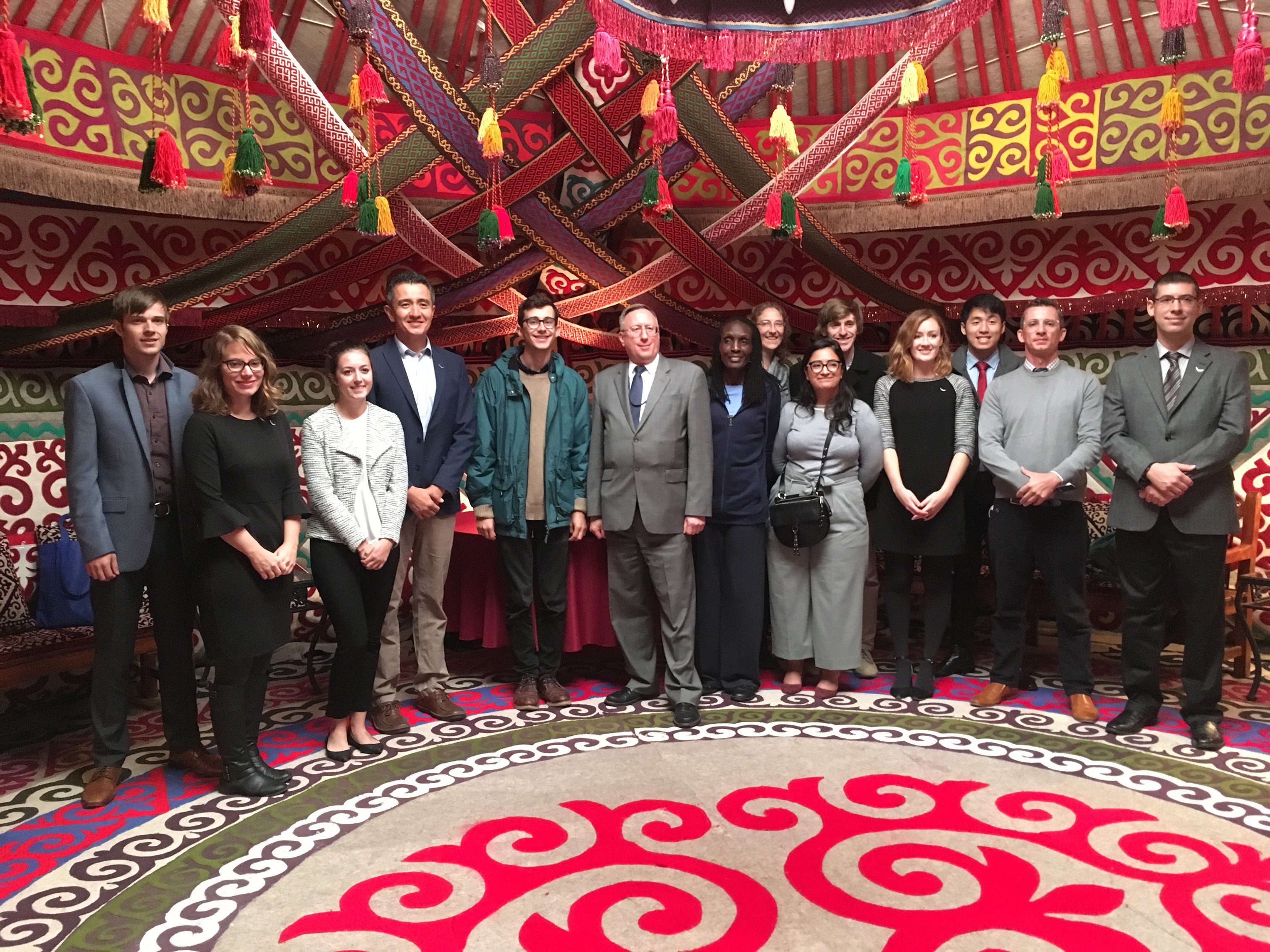All Disciplines
Kazakhstan
Number of recipients
In addition to being a prestigious academic exchange program, the Fulbright Program is designed to expand and strengthen relationships between the people of the United States and citizens of other nations and to promote international understanding and cooperation. To support this mission, Fulbright Scholars may be asked to give public talks, mentor students, and otherwise engage with the host community, in addition to their primary activities.
For teaching awards, scholars teach one to two courses at the undergraduate and graduate levels each semester. Depending on the discipline, scholars consult on curriculum, advise graduate students, direct theses and/or conduct faculty training.
For a teaching/research award, the ratio of these activities should be 50/50. In addition to research, scholars may teach one course per semester or, instead, either advise graduate students or conduct faculty training.
For research awards, scholars are engaged 100 percent in research activities with occasional lectures/talks at the host and other research and educational institutions. We strongly encourage engagement at American Corners when possible.


Priority will be given to proposals at regional or research universities.
5 or 10 months (one or two semesters)
One-semester grants may begin in September 2025 or late January 2026; two-semester grants must begin in September 2025.
Flex grant parameters:
• Minimum length of the total grant is four months and the maximum is six months;
• Minimum length for any grant segment is one month and the maximum is three months;
• Two or three grant segments may be spread over one or two consecutive years
The Flex Award is designed for scholars who require multiple visits to the host country. This option allows grants to be conducted over two or three short segments. Applicants must select Flex in the application form, and clearly describe their plans for Flex in their project statement, including a project timeline. Flex grantees may be asked to give public talks, mentor students, and otherwise engage with the host-country academic community.
While all disciplines are welcome, priority will be given to research and teaching fields in the following areas: renewable energy, sustainability, environmental studies, agriculture, extractive industries, public policy/public administration, law, gender studies, journalism and communications, international relations and area studies, and disciplines which address human rights.
As a trend, the level of English-language skills of students majoring in science, technology, engineering and mathematics (STEM) fields in Kazakhstan have improved over the last few years. Post and host institutions will make every effort to ensure U.S. Fulbright Scholars teach classes to students with adequate English language skills to ensure their active engagement in a course taught by the U.S. Scholar.
All applicants must meet the Program eligibility requirements (click to review the requirements).
An invitation letter may help facilitate placement at that institution but is not a guarantee of final placement. The U.S. Embassy's Public Diplomacy Section (PDS) will decide on the final affiliation. PDS will work with universities to find the best and most appropriate match between the expertise of scholars and the needs of prospective hosts.
All teaching will be in English; foreign language proficiency is not required.
For research projects, foreign language proficiency is not required; however, the feasibility of conducting the project must be demonstrated in the project statement.
Applicants with Ph.D. degrees of all academic ranks (early and mid-career, and senior faculty) or non-academics with Ph.D. degrees and a minimum of three years teaching experience are welcome to apply. Consideration will be given to those with relevant master's degrees and extensive teaching and curriculum development experience.
For country-specific questions, potential applicants may contact Ms. Asiyat Suleimenova, Fulbright Exchanges Coordinator at the U.S. Embassy - SuleimenovaA@state.gov.
For more information on applying, including alumni perspectives, please view our webinars.
Email the South and Central Asia Team with questions about applying.
Stipends are calculated within this range based on a number of factors including a participant’s grant activity, location in the host country, number of dependents, and home institution position.
Round-trip, Fly America Act compliant international travel for the grantee will be arranged by an agency designated by IIE.
Flex grants: Round-trip travel for each segment of the grant. Dependent travel will not be provided for Flex grantees.
Additional Travel and Relocation Allowances: $3,500.00
$1,500 book and educational materials allowance for teaching awards ONLY. Materials to be donated to the host institution (or other entity) upon grantee's departure.
$1,500 Research Allowance (For Research Awards ONLY)
Additional living and housing allowance is provided for grantees with one accompanying dependent or two or more accompanying dependent. These amounts range from $150/month to $500/month.
In addition, travel allowances are provided for up to two dependents.
A dependent education reimbursement allowance is provided ranging from up to $6,000 to up to $24,000 depending on the number of dependents and length of the grant. Reimbursement is based on actual cost of tuition and fees only, and is dependent on funding availability.
Dependents must accompany the grantee for at least 80% of the period abroad and a minimum of one semester in order to qualify for additional dependent benefits. Dependent benefits are not provided to Flex grantees.
Host institutions will help U.S. Scholars find adequate housing for duration of the award. Host institutions may offer on-campus housing, including dormitory rooms or apartments available for university faculty. The cost of living in Astana and Almaty can be twice as high as in regional cities, especially housing costs. Housing costs in Astana or Almaty largely depend on the size of the apartment and location. A monthly rent in Almaty for a 1-bedroom apartment can vary from $700 to $1,200, depending on location and apartment type. Typical grocery items (non-specialty or off-season import) are less than in the United States. Public transportation in Kazakhstan is inexpensive and well-managed. Taxi transportation is widely available and also relatively inexpensive.
South and Central Asia Fulbright Regional Travel Grant
With additional funding provided by the United States Department of State's Bureau of Educational and Cultural Affairs, during their grant period, Fulbright Scholars in the South and Central Asia (SCA) region may apply for a regional travel grant to engage in a variety of activities at academic institutions or non-profit organizations in eligible SCA countries (Bangladesh, India, Kazakhstan, Kyrgyz Republic, Nepal, Maldives, Pakistan, Sri Lanka, Tajikistan, Turkmenistan, and Uzbekistan). Activities that U.S Scholars may engage in include: faculty and student lectures, graduate or faculty seminars, conferences, curriculum development, public lectures, panel presentations, needs assessment, or some combination thereof. Scholars in the arts may be invited to give master classes or recitals, participate in exhibitions or workshops, or consult with cultural institutions. Activities may not include research. This grant will cover travel to and from the destination and lodging may be offered by the hosting institution. Scholars may only apply for this grant once they are in country on their Fulbright grant, and as funds are limited, may only participate in one Regional Travel Grant during their Fulbright grant.
Before traveling to another country on a Regional Travel Grant, it is important to confirm trip details with the U.S. Embassy Public Affairs Section or Fulbright Commission in that country.
South and Central Asia Fulbright Conference
With funding provided by the United States Department of State’s Bureau of Educational and Cultural Affairs, the U.S.-India Educational Foundation (the Fulbright Commission in India) invites eligible Fulbright grantees in the South and Central Asia region to attend the annual South and Central Asia Fulbright Conference in India (usually held in February or March). The conference is an opportunity for Fulbright U.S. Scholars and U.S. Student Researchers who are on their Fulbright grants in the SCA region at the time of the conference to gather to discuss each other’s work, network, and share their experiences as international exchange participants.
Financial assistance to attend the conference is provided as an additional Fulbright grant benefit.
Please refer to the figures above for an estimate of total monthly Fulbright award benefits. Benefits may include a monthly base stipend, living and housing allowances, and additional one-time allowances. Benefits may vary based on a scholar's current academic rank (or professional equivalent), the city of placement, the type of award (teaching, teaching/research, or research), and the number of and duration of stay of accompanying dependents. Research-only or Professional Project grantees receive a standard stipend that is not adjusted for academic rank. In most cases, dependent benefits will not be provided to Flex grantees, or to grantees pursuing grants less than four months (or a semester) in length.
Final grant amounts will be determined prior to the start of the academic year and are subject to the availability of funds. The United States Department of State reserves the right to alter, without notice, participating countries, number of awards and allowances.
Kazakhstan
Kazakhstan is a vast landlocked and ethnically diverse country, which has experienced significant economic growth due to its rich oil and mineral reserves. Kazakhstan is widely recognized for its varied natural landscapes consisting of flatlands, steppes, canyons, hills, deltas, snow-capped mountains, and deserts.
The academic year in Kazakhstan normally lasts 10 months, starting in September and ending in June, including a winter break. The fall semester typically starts on September 1 and lasts until late December. The spring semester typically starts on January 20 and ends in late June.
Fulbright U.S. Scholars are usually hosted by higher education institutions including research and technical universities, and small, private universities. No local language proficiency (Russian or Kazakh) is required as grantees will be affiliated with English speaking faculty members, students, and departments.
Scholars of all academic ranks (early and mid-career, and senior faculty) or non-academics with Ph.D. or other terminal degrees and a minimum of three years teaching experience are welcome to apply. Consideration will also be given to those with relevant master's degrees and extensive teaching and curriculum development experience.
An interview with U.S. Scholar alum Valerie Sartor: https://kz.usembassy.gov/valerie-sartor-language-instructor-defense-language-institute/

Visit our Scholar Directory to view and search all Fulbright alumni. You can also learn more about Fulbright Alumni Ambassadors.

Host institutions and the U.S. Embassy will provide assistance in finding housing.
Grantees with accompanying dependents are welcome to apply. However, the U.S. Embassy Public Diplomacy Section cannot guarantee appropriate daycare or schools for dependent children, nor temporary employment for spouses. Schools with English language instruction for school-age dependents are generally not available outside Astana and Almaty. Grantees must make their own arrangements for daycare, schooling, and temporary employment for dependents.